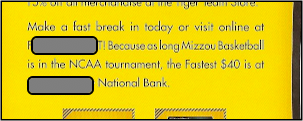
This week my wife got a very handsome direct mail piece from a local bank.
It had a typo.
Boy, have I been there. I’ve made that same mistake.
Here are a couple proofreading tips for you.
1. Don’t let the writer proof his or her own work.
Writers see things as they should be … writers hear words they may have left off the page … writers put proper pacing on perhaps awkwardly written lines.
A second (and possibly third and fourth and fifth – particularly when tens of thousands of dollars are on the line) person with no hint of the writer’s melody should be able to catch these things immediately without the burden of the writer’s curse of knowledge.
2. Read the work aloud.
Our brains are way smarter than our mouths. Talk radio proves this every day. Our brains can fill in blanks and duct tape over mistakes. Our mouths don’t do that. Our mouths will usually catch the mistakes and awkwardness.
First, read this sentence silently … then read it again aloud:
Make a fast break in today or visit online at ourwebsite.com! Because as long Mizzou Basketball is in the NCAA tournament, the Fastest $40 is at Puckleschwartz National Bank.
Reading things aloud – and having others do the same – can easily help prevent mistakes and awkward sentences.
Take it from someone who’s made dozens mistakes and written more than my fair share of awkward sentences.
Any other proofreading tips? I’d love to hear yours in the comments below.

Read the piece backwards. This allows you to focus on the words’ spelling, the punctuation, the spacing (if you’re doing proofreading for layout purposes), and other details that may get missed if you are reading the sentence/paragraph the way it’s meant to be read, and getting distracted by its meaning.
OK. First of all, I suck at proofreading, as anyone who reads my blog well knows. But, here’s one thing that helps, if and only if, it’s horribly inconvenient for you to follow rule #1:
Walk away for a few hours or, even better, overnight. If you have to self edit, give your mind some time to get away from the work and then come back to it. Of course, you don’t always have that kind of time, but it’s kind of a pick your poison thing: either get someone else to read it right away, or give yourself a night to sleep on it. My worst typos and grammatical errors happen when I do neither of those things. Ugh.
Reading out loud is golden, too. I promise to start doing more of that ; )
– Jeff
Adding to Jeff’s comment, I feel eye-fatigue is often the culprit. Try to take a break and go back to your copy with fresh eyes.
Also, if you wear glasses, keep your prescription up to date, make sure your glasses fit and WEAR THEM. This is apropos of a tweet I made yesterday in which I spelled “hoard” as “horde.” My excuse for this copy horror: Our boxer puppy chewed my glasses to pieces. I swear!
I would also add that if you can, have someone who isn’t at all involved in the project read your work. This is particularly helpful when sending a status report or instructions to someone. If the person proofing has questions about something that your writing should have made clear, a revision is in order.
Marry an English teacher.